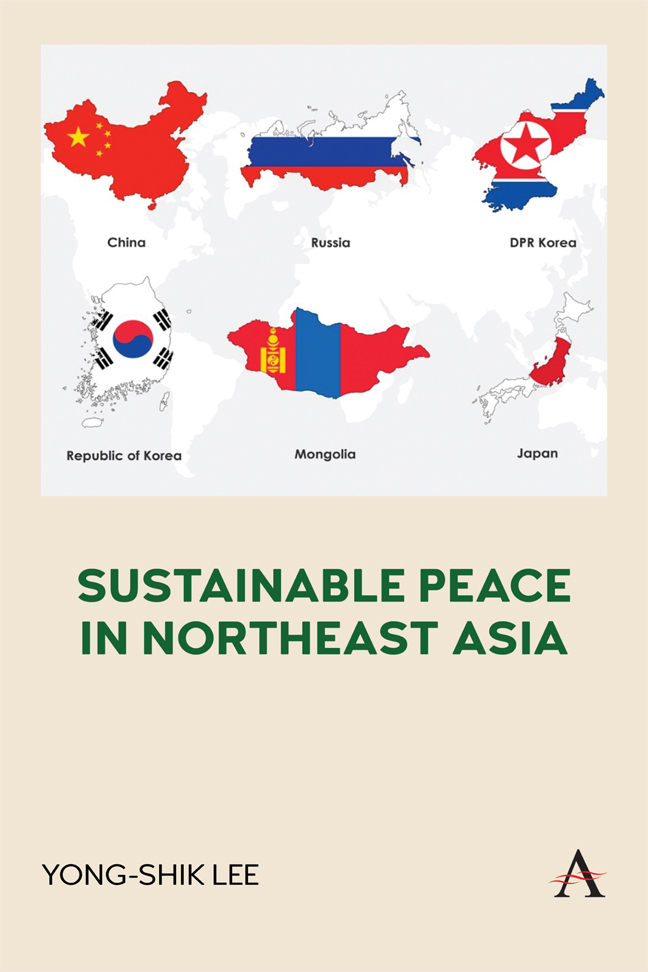Book contents
- Frontmatter
- Dedication
- Advanced Reviews
- About the Author
- Contents
- Figures
- Tables
- List of Abbreviations
- Foreword
- Preface
- Acknowledgments
- 1 Introduction
- 2 The Heritage from the Cold War—North Korea and the Nuclear Crisis
- 3 The New Asian Paradigm or Return to the Old Asia—Rise of China and its Role in the Region
- 4 A New Balancer in the Region? South Korea at the Crossroads
- 5 A Power With Rising Concerns: Escalation of Tensions Between Japan and its Neighbors
- 6 Insiders from the Outside: The United States and Russia
- 7 A Hidden Player: Mongolia and its Role in the Power Dynamics of Northeast Asia
- 8 Pathway to Peace and Stability in Northeast Asia
- Notes
- Bibliography
- Index
8 - Pathway to Peace and Stability in Northeast Asia
Published online by Cambridge University Press: 29 February 2024
- Frontmatter
- Dedication
- Advanced Reviews
- About the Author
- Contents
- Figures
- Tables
- List of Abbreviations
- Foreword
- Preface
- Acknowledgments
- 1 Introduction
- 2 The Heritage from the Cold War—North Korea and the Nuclear Crisis
- 3 The New Asian Paradigm or Return to the Old Asia—Rise of China and its Role in the Region
- 4 A New Balancer in the Region? South Korea at the Crossroads
- 5 A Power With Rising Concerns: Escalation of Tensions Between Japan and its Neighbors
- 6 Insiders from the Outside: The United States and Russia
- 7 A Hidden Player: Mongolia and its Role in the Power Dynamics of Northeast Asia
- 8 Pathway to Peace and Stability in Northeast Asia
- Notes
- Bibliography
- Index
Summary
8.1 Deciphering the Historical, Cultural, Political, and Economic Codes of Northeast Asia
8.1.1 Contextual inquiry
Northeast Asia exhibits complex political, military, and economic dynamism that generates conflicts—often in a manner not easily comprehensible to those unaware of the region's historical, cultural, political, and economic contexts. For example, both South Korea and Japan are close U.S. allies, sharing common values, such as democracy, the rule of law, civil freedoms, and basic human rights. Both countries also form a cooperative security platform with the United States against North Korea (and potentially China and Russia), although South Korea and Japan are not officially “allies.” Yet, intense political and economic tensions have existed between South Korea and Japan over several issues including the comfort women issue, trade conflict (e.g., Japan's restrictive export measure imposed in response to the South Korean court order requiring compensation for forced labor during World War II), and the territorial dispute over the Dokdo Islands. Those who are not aware of the relevant contexts might wonder why two advanced Northeast Asian democracies and close U.S. allies—South Korea and Japan—have been unable to resolve these issues for several decades, creating intense ten-sions not only for themselves but also for the region.
Another example is the statement made by China's Foreign Minister, Wang Yi, in his recent meeting with the South Korean foreign minister, reportedly calling the United States a rule breaker and suggesting that each country must stand up to the United States, when he must have known that South Korea, one of the closest U.S. allies, would be unlikely to join China in such an action. Again, for outsiders, Wang Yi's comment raises a contextual inquiry as to what relationship he presumed exists between South Korea and China that could take precedence over the strong alliance between South Korea and the United States. To understand these seemingly incomprehensible calls to action and long-standing tensions, it is necessary to identify and decipher the historical, political, cultural, and economic “codes” of Northeast Asia that cause, at times, unexpected moves affecting peace and stability in the region.
8.1.2 Nationalism and economic development
The first such code to decipher is “nationalism,” which promotes the interests of a nation (however it is defined) and its political independence. Historically, Korea, Mongolia, China, and Japan all strived for their national preservation and independence, often against each other.
- Type
- Chapter
- Information
- Sustainable Peace in Northeast Asia , pp. 161 - 182Publisher: Anthem PressPrint publication year: 2023



